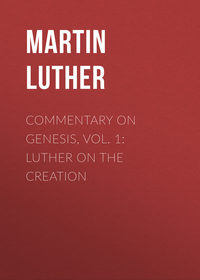Sadece Litres'te okuyun
Kitap dosya olarak indirilemez ancak uygulamamız üzerinden veya online olarak web sitemizden okunabilir.
Kitabı oku: «Commentary on Genesis, Vol. 1: Luther on the Creation», sayfa 6
Bir şeyler ters gitti, lütfen daha sonra tekrar deneyin
Türler ve etiketler
Yaş sınırı:
12+Litres'teki yayın tarihi:
14 eylül 2018Hacim:
610 s. 1 illüstrasyonTercüman:
Telif hakkı:
Public Domain